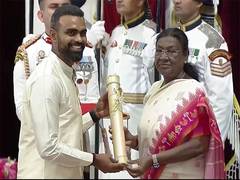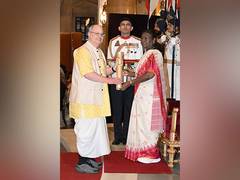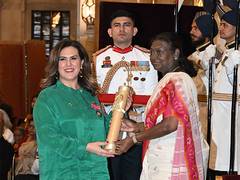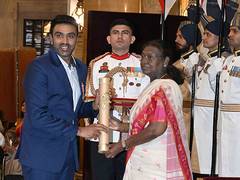Mallikarjun Kharge pays tribute to Vikram Sarabhai on his birth anniversary
New Delhi [India], August 12 (ANI): Congress MP Mallikarjun Kharge on Monday paid tribute to Vikram Sarabhai on his birth anniversary stating that the Indian scientist’s legacy continues to inspire innovation and progress.
Taking to social media platform X, Kharge said, “We honour the exceptional legacy of the ‘Father of India’s Space Program’ and illustrious physicist, Dr. Vikram Sarabhai on his birth anniversary”.
He further stated that his contribution to the formation of the Indian National Committee for Space and Research (INCOSPAR), which is the precursor to the Indian Space Research Organization (ISRO) is India’s greatest achievement.
“His close association with Pandit Nehru led to the formation of INCOSPAR, precursor to ISRO – one of India’s greatest achievements,” he said.
Highlighting Sararabhai’s contribution in founding numerous institutions in the country he said “A Padma Vibhushan recipient, Dr. Sarabhai founded numerous institutions and chaired the Atomic Energy Commission”.
“His legacy continues to inspire innovation and progress, and is a shining example of fostering scientific temper among the masses” the Congress MP added.
ISRO paid tribute to Vikram A Sarabhai by sharing a video on its ‘X’ handle.
“The country proudly celebrates the birthday of Dr Vikram A Sarabhai” the post read.
Congress MP Manickam Tagore also took to platform X, to pay his tribute “Honoring Dr. Vikram Sarabhai, the ‘Father of India’s Space Program’ on his birth anniversary,” he said.
“His visionary leadership led to the creation of INCOSPAR, now ISRO, and inspired a legacy of scientific innovation. A true pioneer, his work continues to guide India’s progress” the Congress MP added.
Sarabhai a physicist and astronomer initiated space research and helped to develop nuclear power in India.
He is widely regarded as the “Father of Indian Space Program’. He was born on this day in the year 1919.
Vikram Ambalal Sarabhai was instrumental in establishing the Physical Research Laboratory (PRL) in Ahmedabad on November 11, 1947.
After returning from Cambridge to an independent India in 1947, he persuaded charitable trusts controlled by his family and friends to endow a research institution near home in Ahmedabad.
He was only 28 at that time.
Sarabhai was a creator and cultivator of institutions and PRL was the first step in that direction.
Vikram Sarabhai served of PRL from 1966-1971.
He was also Chairman of the Atomic Energy Commission.
He along with other Ahmedabad-based industrialists played a major role in the creation of the Indian Institute of Management, Ahmedabad.
The establishment of the Indian Space Research Organisation (ISRO) was one of his greatest achievements. He successfully convinced the government of the importance of a space programme for a developing country like India after the Russian Sputnik launch.
Homi Jehangir Bhabha, widely regarded as the father of India’s nuclear science program, supported Sarabhai in setting up the first rocket launching station in India. This centre was established at Thumba near Thiruvananthapuram on the coast of the Arabian Sea, primarily because of its proximity to the equator.
After a remarkable effort in setting up the infrastructure, personnel, communication links, and launch pads, the inaugural flight was launched on November 21, 1963 with a sodium vapour payload.
Sarabhai was born on August 12, 1919 in Ahmedabad.
The Sarabhai family was an important and rich Jain business family. His father Ambalal Sarabhai was an affluent industrialist and owned many mills in Gujarat. Vikram Sarabhai was one of the eight children of Ambalal and Sarla Devi.
Sarabhai matriculated from the Gujarat College in Ahmedabad after passing the Intermediate Science examination.
After that he moved to England and joined the St. John’s College, University of Cambridge. He received the Tripos in Natural Sciences from Cambridge in 1940.
With the escalation of the Second World War, Sarabhai returned to India and joined the Indian Institute of Science in Bangalore and began research in cosmic rays under the guidance of C V Raman, a Nobel Laureate.
He returned to Cambridge after the war in 1945 and was awarded a PhD degree in 1947 for his thesis titled Cosmic Ray investigation in Tropical Latitudes.
Vikram Sarabhai died on December 30, 1971 at Kovalam, Thiruvananthapuram, Kerala.






